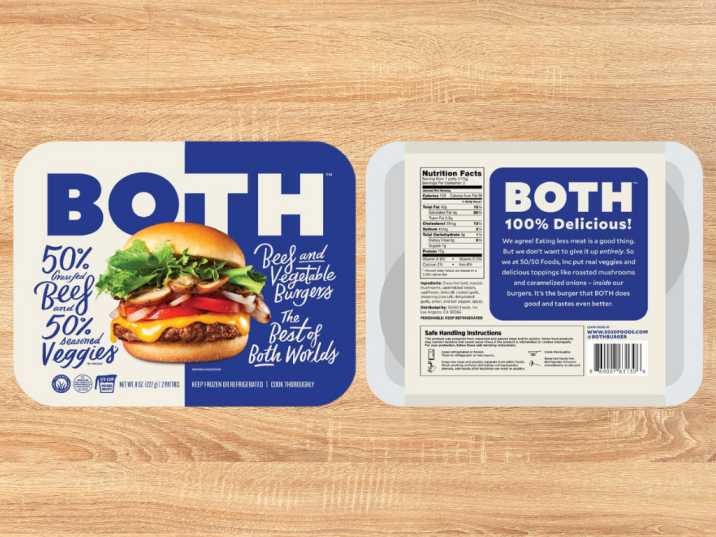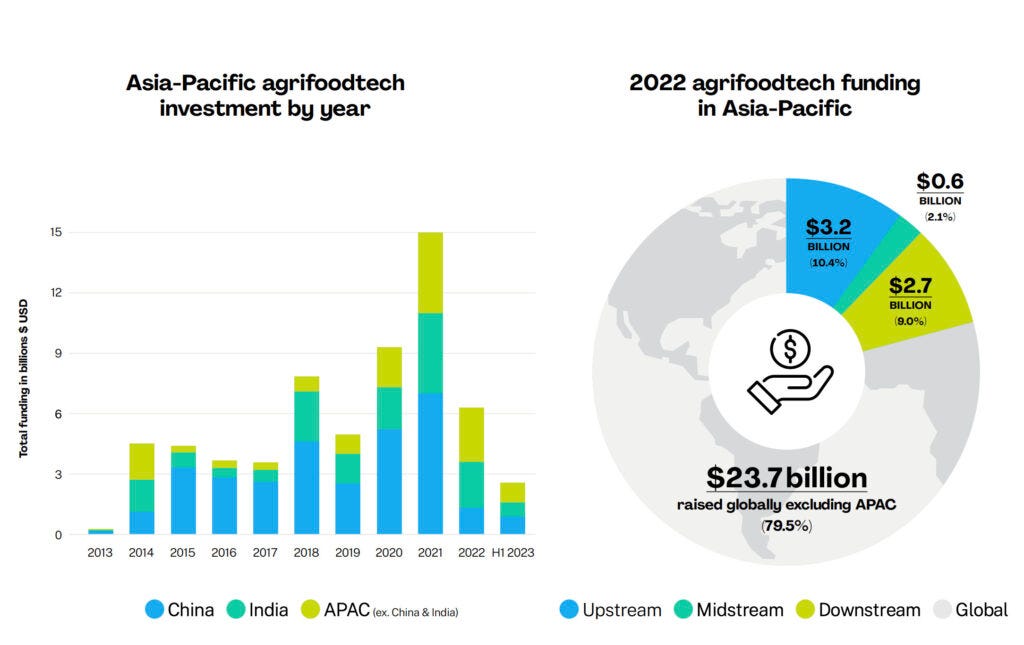Carbon-Negative Food, Cocoa-Free Chocolate, and South Korea's Plan to Boost Plant-Based Industry
Also: Is the sole responsibility of a food company to maximise shareholder value?
BIO BUZZ
🤝 Plantible Foods and ICL Food Specialties have introduced ROVITARIS, a clean label binding solution for plant-based meat and seafood
ROVITARIS is a functional protein system designed to replace chemically processed binders like methylcellulose, improving the taste and texture of plant-based meat and seafood products.
It features RuBisCO, a protein extracted from duckweed (Lemna) known as Rubi Protein, which contains essential amino acids and can mimic the functions of animal proteins. The Rubi Protein is also neutral in colour, odour, and flavour.
ROVITARIS is the first product resulting from a multi-year commercial agreement between the two companies and will be available in the US in 2024.
Read full article - vegconomist
🍼 Tiamat Sciences and BIOMILQ demonstrate the effectiveness and affordability of plant-based recombinant protein Human Prolactin
Tiamat Sciences specialises in animal-free protein production, leveraging versatile plant-based platforms for cost-effective and rapid development of new proteins, reducing production time significantly.
BIOMILQ utilises patented technology to produce human milk components through cell culture technology, offering the potential to bring breast milk benefits to more babies.
The collaboration highlights the potential for more sustainable and cost-effective biotech solutions. This work offers significant scalability prospects in biotech, particularly in the cost-driven cell-based food industry.
Read full article - PR Newswire
🍫 WNWN Food Labs has launched cocoa-free chocolate bars that replicate popular chocolate bars both in taste and packaging
The new bars include Choc Nut (cocoa-free chocolate with hazelnut paste), Choc Orange (orange and grapefruit-flavored chocolate), and Vegan M•lk Choc (a classic plant-based milk chocolate bar).
The cocoa alternative used in these bars is made using plant-based fermentation techniques, is caffeine and theobromine-free, and the packaging is either recyclable or compostable.
The UK-based cocoa-free chocolate producer aims to provide a more ethical alternative to conventional chocolate production, addressing issues like deforestation, slavery, and child labour.
Read full article - vegconomist
🇳🇱 Dutch supermarket chain Jumbo is aiming to have 60% of its protein offerings sourced from plants by 2030
Jumbo actively promotes plant-based eating with its own vegan brand, Lekker Veggie, and plans to expand its plant-based product range.
The commitment aligns with Jumbo's climate goals, which include an 85% reduction in CO2 emissions from business operations and a 50% reduction in supply chain emissions by 2030.
Competing supermarket chains like Albert Heijn are also transitioning to 60% plant-based protein products by 2030, highlighting the growing trend towards plant-based diets in the European market.
Read full article - vegconomist
👏🏾 GOOD Meat’s cultivated chicken earns a spot on TIME’s best inventions of 2023
Time Magazine's annual "Best Inventions of 2023" highlights innovative products and ideas from various fields. The selection process considered factors such as originality, effectiveness, ambition, and impact.
GOOD Meat, a subsidiary of Eat Just, made the list with its cultivated chicken, showcasing advancements in plant-based technology.
The list encompasses groundbreaking inventions across AI, green energy, and sustainability, indicating the growing importance of these areas in innovation.
Read full article - vegconomist
🍔 50/50 Foods founder on hybrid meat: We’re the Google to Beyond Meat’s and Impossible Food’s Yahoo
Blended or hybrid meat, which combines traditional animal protein with plant-based ingredients, is proposed as a solution to reduce excessive meat consumption without sacrificing taste.
Consumer research indicates that taste is a crucial factor in choosing meat alternatives, with many consumers preferring the taste of animal protein over plant-based alternatives.
Blended meat companies like 50/50 Foods aim to target consumers who want to reduce meat consumption for environmental and health reasons while still enjoying the taste of meat.
“I’m too practical to let perfect be the enemy of the good. Cutting beef consumption in half will save lots of animals, so we’re technically on the same team.” - Andrew Arentowicz, CEO of 50/50 Foods
Read full article - Green Queen
📉 ADM's plant protein investment project has been "re-scoped" due to sluggish demand for meat alternatives
Weak market demand (particularly in alt meats), inventory adjustments, and unplanned downtime have significantly impacted ADM's specialty ingredients division's year-over-year results.
The plant-based protein market has been experiencing destocking and soft consumer demand, leading ADM to adjust its investment project to match the expected lower growth demand environment.
Despite the challenges in the meat alternatives market, ADM has aggressively expanded its capacity in plant-based proteins and remains committed to being a leader in the alternative protein industry.
Read full article - AgFunder
MACRO STUFF
🇰🇷 South Korea announces national plan to boost local plant-based industry
The plan includes initiatives such as establishing a research centre for alternative protein, expanding export potential, and using more locally produced ingredients in plant-based alternatives to meat and dairy.
The South Korean vegan substitute market is projected to reach ₩280 billion ($207.4 million) by 2026, driven by growing popularity among people in their 20s and 30s.
The government's support for alternative protein innovation and the increasing number of vegans and vegetarians in South Korea reflect the country's expanding vegan industry.
Read full article - Green Queen
🇩🇪 The prices of animal and plant-based products are converging in Germany
The price difference between plant-based and animal-based products has dropped from 53% to 25% in one year. Surcharges for plant-based alternatives in Germany are decreasing as retailers adjust their prices
Four major retail chains, including Lidl, Kaufland, Penny, and Aldi Süd, now offer their own-brand plant-based products at the same price as animal-based products.
Plant-based products are gaining popularity in Germany, with one in ten people purchasing them daily. Price is an important factor for consumers, as 57% of those surveyed look for inexpensive food.
Read full article - vegconomist
🦐 New GFI report highlight the potential of alternative seafood to address seafood demand while meeting climate and biodiversity goals
Traditional fishing and aquaculture harm oceans and the environment, threatening biodiversity and marine habitats. Yet, from 2020 to 2030, seafood production is expected to increase by 14%
Plant-based and cultivated seafood can help mitigate greenhouse gas emissions, biodiversity loss, and other global challenges. They have a lower environmental footprint compared to conventionally farmed seafood and could fill the seafood supply gap.
GFI emphasises the importance of policy initiatives to support public research and development, streamline regulations, ensure fair labelling practises, and protect the oceans. Alternative seafood has the potential to provide nutritious protein while reducing pressure on ocean ecosystems.
Read full article - vegconomist
Download the white paper - GFI
New here? Devour the free subscription and join a list of founders, investors, and biotech enthusiasts leading the food revolution!
BIO BUCKS
🌏 Investment in APAC agrifood tech startups declined by 58% in 2022 compared to the record-breaking year of 2021
Upstream technologies, particularly Ag Biotechnology, emerged as the top category, with significant funding growth from $142 million in 2021 to $813 million in 2022.
Downstream categories like food delivery and eGrocery, previously dominant, saw a slowdown in funding as the impact of the pandemic lessened, leading to a shift in investment focus.
India overtook China as the top country for agrifood tech investment in 2022, but China reclaimed the top spot in H1 2023, followed by India, Hong Kong, and Australia.
Read full article - AgFunder
Down full report - AgFunder
💰 Better Bite Ventures invests in three APAC food tech startups developing plant fats, whole cuts and cultivated pet food
Fattastic: Engineers plant-based fats to enhance the taste and texture of vegan meat and dairy analogues by transforming plant oils into solid states resembling animal fats.
Pivot Eat: Focuses on developing a novel process to improve the structure and scalability of plant-based whole-cut meat.
Everything But: Asia's first cultivated meat startup for pet food. It aims to reduce the environmental impact of pet food consumption by creating sustainable, protein-rich alternatives with high taste, texture, and nutritional quality.
Read full article - Green Queen
🐔 The global vegan chicken nugget market is expected to grow at a CAGR of 12.5% through 2029
Growth in the market is driven by rising health consciousness, particularly during COVID-19, with some consumers reducing their meat consumption out of concern for the link between animal agriculture and infectious diseases.
Online food purchases have increased due to the pandemic, benefiting some vegan chicken nugget brands.
Factors such as the desire for ethical and sustainable lifestyles, and modernization in developing countries contribute to the market's opportunities, with the APAC region experiencing the highest growth rates.
Read full article - vegconomist
🇯🇵 The Japanese vegan food market is projected to grow at a CAGR of 11.2% through 2028
Japanese consumers seek healthier alternatives to traditional animal products, and established companies are introducing a wide range of innovative plant-based products. Plant-based diets are associated with health benefits such as reduced risk of chronic diseases and weight management.
Climate-conscious meat eaters, or flexitarians, are contributing to the market's growth. Food companies are using advanced food technologies to create realistic meat alternatives in terms of taste, texture, and nutrition.
The availability of vegan options in restaurants, cafes, and supermarkets is fueling consumer interest and adoption of plant-based diets. The foodservice industry plays a significant role in this transition, with fast food chains and popular brands offering plant-based products.
Read full article - vegconomist
SOCIAL FEAST
🤑 Do food companies have a duty to provide us with healthy and sustainable diets, or is their sole responsibility to maximise profits?
Many major food companies fall short in addressing sustainability and health concerns, with only a minority having climate, deforestation, nutritional quality, and regenerative agriculture commitments.
The food industry significantly contributes to global greenhouse gas emissions, deforestation, water pollution, and soil degradation, but only a small percentage of companies are taking meaningful action to address these issues.
There is a significant income disparity among small-scale farmers, and very few companies are actively working to bridge this gap, highlighting a lack of social responsibility within the food industry.
Read full post on LinkedIn - Irina Gerry
🤔 Processed foods might not be the enemy after all – it's time to challenge the misconceptions
Processing has no direct relationship with the nutritional value of a food or beverage. Misconceptions about food processing, such as the belief that all processed foods are bad for health, are widespread and need to be challenged.
Not all processed foods are equal; there are various reasons to process food, and many processing methods have historical roots.
The health properties of a food or beverage are influenced by multiple factors, and it's not fair to categorize all processed items as equally unhealthy; some processed foods can be part of a healthy diet.
Read full post on LinkedIn - Camila Perussello
📈 In just the first few weeks of Q4, the food cellular agriculture field has raised more than double the total investments in Q3
In the first few weeks of Q4 this year, investments in cellular agriculture have more than doubled compared to Q3, with a total of $81.5 million raised in the first few weeks of October 2023 compared to $40.2 million in disclosed funding in Q3.
Notable funding rounds include Australian startup Eden Brew securing AUD 24.4 million and French startup Bon Vivant raising €15 million for their respective ventures in precision fermentation dairy production.
Despite the increase, the overall investment in the cellular agriculture food sector for 2023 remains notably lower than in the previous year, reaching $289 million compared to $1.23 billion in 2022.
Read full post on LinkedIn - Ahmed Khan
Got a taste for this newsletter? Dish it out to your friends!👇🏾
EAR FOOD
🎙 Producing carbon-negative food by turning CO2 into amino acids
Show: Another ClimateTech Podcast
Host: Ryan Grant Little
Guest: Gregor Tegl, CEO and co-founder at Arkeon
Arkeon is using an ancient microbe found in hard-to-reach places like the ocean floor and volcanoes to produce essential amino acids from CO2 and hydrogen. This approach has promising applications in the food industry, particularly in producing clean-label, great-tasting protein products.
Arkeon's technology is carbon-negative, as it consumes significant amounts of carbon dioxide. One large bioreactor can offset around 40,000 tonnes of CO2 annually, and the long-term plans involve scaling up production to have a substantial impact on carbon offsetting.
Gregor acknowledges the challenges of scaling up production, including delays in hardware procurement. He also highlights the changing landscape of climate tech investments, emphasising the importance of transparency and realism in discussions with investors.
THAT’S ALL FOR THIS WEEK!
Take care, and have an awesome week! 🙌🏾
Are you new here?
Know any other geeks who would dig this newsletter?







